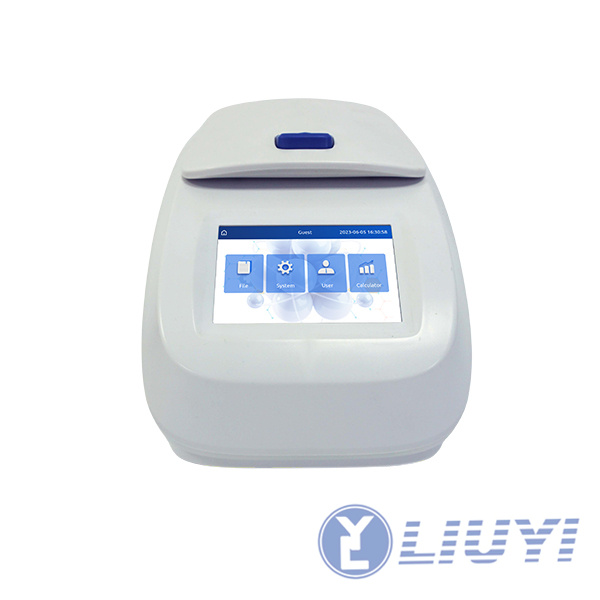The principle of a 96-well PCR machine is to control the temperature of the heating block to carry out different steps of PCR. The heating block is typically a metal block with 96 wells, each containing a PCR reaction mixture. The temperature of the heating block can be controlled according to a specific PCR program. The temperature control system usually consists of a Peltier chip, which can generate heat or a cooling effect when current passes through it. By reversing the direction of the current, both heating and cooling functions can be achieved. Sensors monitor the temperature of the heating block and transmit the measured temperature information to the control unit.
The control unit adjusts the temperature of the heating block based on the preset PCR program. For example, during the denaturation step, the control unit raises the temperature of the heating block to 95°C. During the annealing step, the temperature is lowered to the annealing temperature of the target sequence primers. In the extension step, the temperature is increased again to the optimal temperature for the activity of the extension enzyme. A cooling system is also used to control temperature. The cooling system typically uses refrigerants or Peltier chips for cooling. Through this process, the 96-well PCR machine can efficiently amplify specific DNA fragments and produce large amounts of DNA products in a short period of time.
The 96-well PCR machine is widely used in the following fields:
Molecular Biology Research: Used for the amplification, detection, and quantitative analysis of DNA, RNA, and proteins, such as gene expression, mutation analysis, genetic disease diagnosis, and virus detection.
Medical Diagnosis: Used in clinical laboratories for PCR diagnostics of pathogenic microorganisms, such as influenza viruses, tuberculosis bacteria, etc.
Genetic Engineering: Used for constructing recombinant DNA, gene insertion, gene cloning, and gene editing in biotechnology operations.
Agricultural Science: Used for crop genetic improvement, disease detection and identification, and variety identification.
Basic Research: Used in fields like biology, genetics, and evolutionary studies to explore gene functions, evolutionary relationships, and more.
Forensic Science: Used for identifying the source of DNA samples, conducting forensic analysis, and field DNA testing.
Environmental Monitoring: Used for the detection and monitoring of microorganisms in water, soil, and air, and for studying biodiversity and ecosystems in the environment.
Science Education: Used for molecular biology experiments in educational settings to cultivate students’ laboratory skills and scientific thinking abilities.
Beijing Liuyi Biotechnology Co., Ltd. (Liuyi Biotechnology) has over 50 years of expertise in manufacturing electrophoresis instruments. With a dedicated technical team and R&D center, we provide reliable and comprehensive production, from design to inspection and warehousing. We offer a full range of products, including:
- Electrophoresis Cells (Tanks/Chambers)
- Electrophoresis Power Supplies
- Blue LED Transilluminators
- UV Transilluminators
- Gel Imaging & Analysis Systems
In addition, we supply other laboratory instruments such as PCR machines, vortex mixers, and centrifuges.
If you are considering purchasing our products, please don’t hesitate to reach out. You can contact us via email at sales@ly.com.cn or info@ly.com.cn. Alternatively, feel free to call us at +86 15810650221, add us on WhatsApp at +86 15810650221, or connect with us on WeChat at 15810650221.
Please scan the QR code to add us on WhatsApp or WeChat.
Post time: Mar-17-2025







